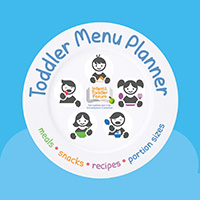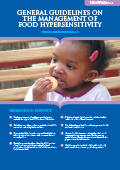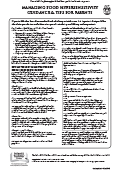
Use our Toddler Meal planning tool to ensure your 1-4 years old receives a balanced diet every day.
Find out more >
Use our toddler food tracker to check that your 1-4 year olds are getting a good balance of foods and activity
Find out more >
This educational programme for frontline professionals contains a range of practical resources on infant feeding.
Find out more >Guidance & Tips for Parents
If your toddler has been diagnosed with a food allergy or intolerance, it is important that you follow the advice your doctor or dietitian gives you about what your child may and may not eat.
If you have been advised that your toddler should avoid even the smallest amounts of certain foods then:
- if someone else is preparing food always tell them about your child’s food allergies/intolerances beforehand
- ask the person preparing the food or in charge of food preparation to show you ingredient labels or recipes
- where possible offer to help with food preparation
- you can develop a ‘chef card’. This is a small card that lists the foods that your toddler must avoid. It can be carried around to inform others of what foods your toddler can and cannot eat
- if you are not sure how safe foods will be, bring your own food or carry some snacks that your toddler can eat
- always carry necessary medication
How can you safely manage your toddler’s food allergies or intolerances?
You can avoid problems by planning, using common sense, and by being determined not to take chances with risky foods. Some manufacturers provide allergen information on the packaging such as: ‘This product contains milk, egg etc’. This information is not legally required and can therefore not always be relied on. It is advisable to always read the ingredients list.
When shopping
Shopping for a special diet can be difficult at first, but should get easier. Reading food labels is very important especially those with ‘new’ or ‘improved’ printed on them. Culprit foods may have many different names. See the checklist of the most common culprit foods below.
There are now special ‘free-from’ foods available such as egg-free, milk-free, wheat-free, and nut-free. A dietitian will be able to advise you about the suitable use of these products.
Most supermarkets and manufacturers also provide ‘free-from’ lists on which all their own-brand products are listed according to their suitability for various diets. Always make sure that you have an up-to-date list. However, food labels still need to be checked.
When cooking
Many recipes can be adapted to use an alternative to the problem ingredient. Try out some new recipes that are suitable. There are many special diet cookbooks with suitable meals, snacks and baked foods for special diets. A dietitian or someone with food allergy may be able to give you some well-tested recipes.
When eating away from home
Try to discuss the menu with the host/chef/restaurant manager beforehand and make recommendations regarding suitable choices, avoiding the food or foods your toddler should not eat.
It is important to ask questions regarding ingredients and food preparation.
Remember to ask about the cleaning of utensils and serving of foods because cross-contamination can happen. It is also important to make sure your toddler does not pick food up from the floor or someone else’s plate.
You should ask to check food labels and ingredients whenever possible by either calling ahead or arriving early. If you have a chef card, now is the time to use it. Always ask the person who is preparing your food if you have not had time to check beforehand. It is not adequate to rely on the word of a waiter or the person serving the food if a specific dish contains a particular ingredient, as they are not likely to be fully aware of all the ingredients.
Always remember that it is better to avoid foods if you do not know the ingredients, especially if your child has a severe food allergy.
Checklist
| Foods and ingredients to avoid by toddlers hypersensitive to:
Milk: Butter, casein, cheese, cow/sheep/goat’s milk, evaporated or condensed milk, cream, curd, ghee, lactoglobulin, lactose, milk solids, whey, yogurt, milk proteins. Egg: Albumin, dried egg, egg powder, egg protein, egg white and yolk, frozen egg, globulin, lecithin (E322)*, livetin, ovalbumin, ovoglobulin, ovomucin, ovovitellin, pasteurised egg, vitellin. Wheat: Bran, cereal filler, farina, flour, spelt, wheat starch, wheat, durum wheat, semolina, couscous. Fish: All fish in addition to, anchovy, fish sauce, aspic, caviar. Nuts: Peanuts, peanut oil which is also called arachis oil/hypogeaia, peanut flour, peanut protein or any of the tree nuts: Almond, Hazelnut, Walnut, Cashew nut, Pecan nut, Brazil nut, Pistachio nut, Macadamia nut and Queensland nut. ‘Refined’ peanut oil appears to be safe (given recent evidence) but if it does not specify that it is ‘refined’ – avoid. Do not need to avoid coconut, palm nut, nutmeg, butternut squash and pine nuts unless a specific problem with it. Soya: Hydrolysed vegetable protein (which can be made from soya), soya lecithin*, soya sauce, miso, soya albumin, soya beans, soya flour, soya milk, soya nuts, soya oil, soya proteins, soya sprouts, tempeh, texturised vegetable protein, tofu. |
www.allergyaction.org, www.allergyuk.org, www.kidsaware.co.uk or www.yellowcross.co.uk provide translation sheets for families travelling abroad. These will inform people about your toddler’s food allergy or intolerance, and also give you a list of food ingredients to look out for while you are travelling.
The anaphylaxis campaign www.anaphylaxis.org.uk also provides useful information for those with food allergies.
Factsheets for parents are available at the British Dietetic Association: www.bda.uk.com/foodfacts/home#nutrients




